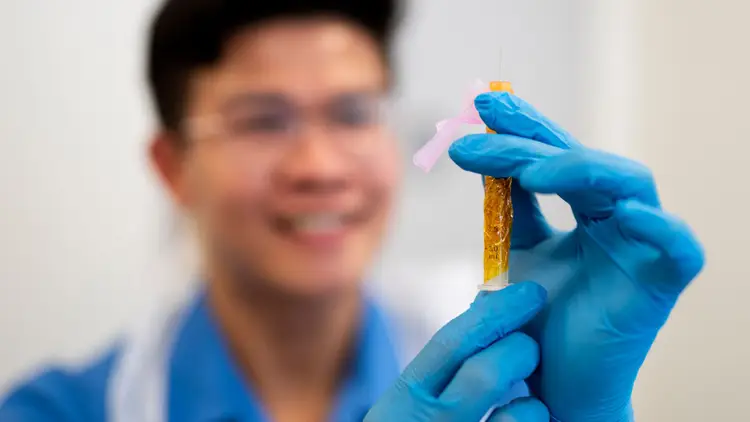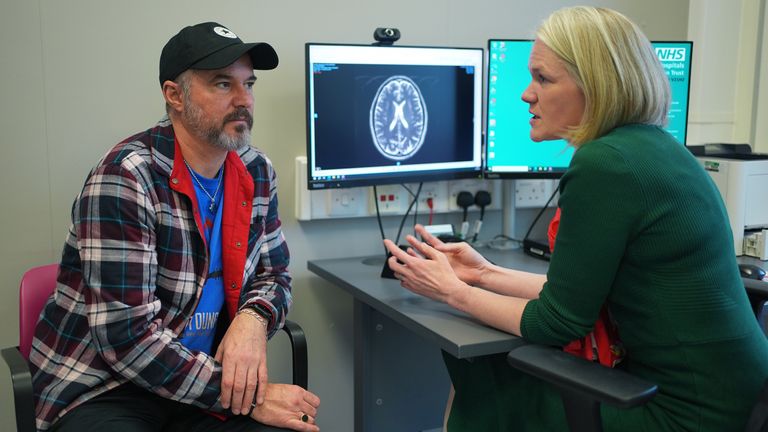World's first jab to stop skin cancer being tested in UK patients

British patients are currently undergoing testing for a groundbreaking, one-of-a-kind mRNA cancer vaccine that is personalized specifically for those with melanoma.

The injection known as the "gamechanger" could potentially put a stop to cancer affecting the bladder, lungs and kidneys.
Each individual receives a specially tailored treatment that trains the body to recognize and prevent the recurrence of cancer cells.
The second phase of a study discovered that it greatly decreased the likelihood of cancer returning among individuals with melanoma, and presently, a conclusive trial has commenced.
UCLH is in charge of the current stage.
According to Dr. Heather Shaw, who is in charge of the trial, this is one of the most thrilling developments that they have seen in a while.
She expressed that the tool was expertly crafted and highly precise.
Being able to tell your patients that you're giving them something as good as the Fat Duck in Bray instead of McDonald's is a great feeling. It means that you're offering them a very high-quality level of service.
These devices are extremely advanced and intricately crafted to suit the needs of the individual receiving them. The recipients are eagerly anticipating the use of these devices.
The vaccine is a personalized treatment called neoantigen therapy (INT) which can stimulate the body's immune system to combat the particular cancer type of the patient.
In order to develop a customized treatment plan, doctors remove a sample of the tumor and conduct DNA sequencing on it. Artificial intelligence is also involved in this process.
According to Dr. Shaw's statement, this therapy is highly personalized and more intelligent in some ways than a vaccine.
This is entirely tailored to the specific patient's needs. It wouldn't be suitable to pass it on to the next person in queue since it wouldn't function as expected.
She stated: "I believe that these have the potential to drastically change the field of immunotherapy."
A frequently occurring type of cancer that can be remedied through the means of a surgical procedure.
According to information found on the NHS Digital website, skin cancer was the most commonly diagnosed form of cancer in England in 2019 with a total of 224,000 cases. Between 2013 and 2019, there were over 1.4 million cases of skin cancer. In contrast, the total number of new cancer diagnoses in 2020 was 288,753.
In the year 2021, the latest year with data available, England saw a total of 15,861 new instances of skin cancer known as malignant melanoma. This number included individuals of all age groups.

Out of the total, 15,861 individuals, 8,078 were males and 7,783 were females.
The region of Devon suffered the most in the NHS, with a total of more than 300 cases in both males and females of various age groups.
In the year 2020, the number of deaths caused by cancer decreased slightly by 1% in men and 2% in women in comparison to the figures from the previous year.
According to the website of the Royal Marsden NHS Foundation Trust, approximately 15,400 individuals receive a diagnosis of melanoma annually in the UK.
The frequency of dangerous melanoma in the United Kingdom has accelerated more rapidly compared to other prevalent cancers. Throughout the last ten years, the quantity of individuals detected with melanoma in Great Britain has advanced by nearly fifty percent.
As we age, the likelihood of developing skin cancer increases. In the UK, melanoma ranks as the fifth most prevalent type of cancer.
In the United Kingdom, male cancer deaths account for 2% due to melanoma skin cancer while female cancer deaths account for 1%.
The occurrence of malignant melanoma is growing at a speedy pace. From 1997 onwards, those over 55 years have seen a surge of 155%, whereas those under 55 years have witnessed a rise of 63%.
If melanoma is detected early, surgery is often the primary method of treatment. However, NHS Digital stated that radiotherapy, medications, and chemotherapy may be utilized in certain circumstances.
A medical operation can eliminate the melanoma as well as a portion of normal skin surrounding it. This assists in decreasing the likelihood of the melanoma returning.
If cancer has spread to the lymph glands and melanomas have spread to different parts of the body, then swollen lymph glands may be extracted.
If the melanoma is on a visible part of the body, plastic surgery can be an option and skin grafts may also be used if needed.
The ultimate goal is to cure cancer and eliminate any irregular cells that may not appear visible on scans.
During the second phase of the research, it was discovered that those who were given the injection together with Keytruda, an immunotherapy medication, had a 49% lower likelihood of dying or experiencing a cancer recurrence after three years compared to those who only received Keytruda. This study specifically targeted those who had high-risk melanomas.
Discover additional information on Sky News: Children's brain cancer treatment that can be taken at home will soon be accessible through NHS.
In the upcoming phase-three of the clinical trial, researchers aim to enroll a more diverse group of patients and anticipate recruiting approximately 1,100 individuals.
A minimum of 60 to 70 individuals from eight different locations in the United Kingdom will be enlisted, and the dual treatment method will also be evaluated for its effectiveness on lung, bladder, and kidney cancer.
Keep up-to-date with the latest news by following Sky News on WhatsApp. Stay tuned and be informed with breaking news, expert analysis, and exclusive interviews from around the world. Don't miss any major events or significant stories with this easy-to-use service. Join the millions of people who trust Sky News for reliable, up-to-the-minute reporting. Simply click the link to get started and join the conversation today.
Stay up-to-date on the most recent happenings in the UK and globally by tracking Sky News.
According to Professor Lawrence Young from the University of Warwick, this is one of the most captivating advancements in contemporary cancer treatment.
In the last few years, there has been renewed attention given to cancer vaccines due to a better comprehension of how the immune system manages immune responses. Additionally, the emergence of mRNA vaccines has simplified the process of constructing a vaccine that is grounded on a patient's tumour immune profile. Professor Young stated this.
The expectation is that this strategy could be expanded to cover other types of cancer such as carcinoma of the lungs and intestines.









































